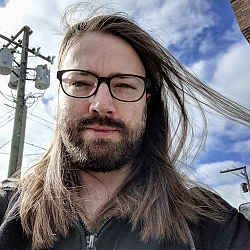
| Name | Brenden M. Recommended |
|---|---|
| City | Vancouver, BC |
| Teaching | Philosophy, Literature, Study Skills, Humanities, Writing, Reading, Religious Studies, Language Arts, History, Essay Writing, Science |
| Speaking | English |
| Originally From | Canada |
| Working With | Adults, Groups |
| Levels I Teach | Beginner, Intermediate, Advanced |
| Lessons Take Place | My Home/Office, Learner's Home or Work, Public Place, Online |
| Hourly Rate | C$25 |
I studied philosophy as a Major and English as a Minor in my B.A I went to audio engineering school after my B.A. Philosophy is endless and ancient. From the outside it might literally sound like a bunch of familiar and unfamiliar names. Who was Socrates, or Spinoza? The names of "great men" resound through the titles of streets, buildings, schools, but usually for being emphasized. What is the substance of these thoughts?
I earned my B.A. with a major in philosophy and a minor in English at Vancouver Island University in Nanaimo.
During six years at VIU, I also took many elective courses in sociology, linguistics, music, math, and physics.
I also have an "unrelated" Audio Engineering and Production certification. However, music and art are very close to language and philosophical inclination.
In my years there, I had a special focus on Deep Ecology in the 20th Century which included directed studies on Spinoza's influence.
In grade school, my peers called me "a human dictionary" because I fetch synonyms rapidly and can come up with definitions that get the point across for the moment.
I like etymology, history, and often see connections between strands of philosophy from different authors and schools of thought regardless of the permission of existing textbooks to do so.
Now, I mostly work on audio and QA but have a lots of interest in teaching and tutoring.
I would be a good tutor for an undergrad student in philosophy, English, or some humanities courses.
You identify areas in which you wish to gain some insights or learn about, I could help you by listening to try to explain what you are learning to help you get in the habit of pondering and expressing in the moment (good for exams).
In older writing from another era, the meaning can seem opaque. When we reveal what they could mean using some ideas and examples from closer to our day, however, we can get to some "Aha!" moments.
Oftentimes, an old philosopher's ideas from another language got translated a particular robotic way after the 1800s and students in 2008 would tell me "oh, is that the categorical imperative?" - when in fact, yes, concepts and language evolve. We are not restricted to the theories of old dudes and their terms only.
So many ideas are useful. Let's think for ourselves and work on things in a wide range and open way, doing so with the skills and resources we have.
Let's talk about your timing and availability.
|
|
Let's meet at the library, or have a chat via audio/video.

Brenden simplified the concepts in my philosophy class, so that I could understand them and apply them to modern-day situations. He would also come up with relevant examples for my field of study (health care). I am not sure how I would have gotten through these texts without his support!